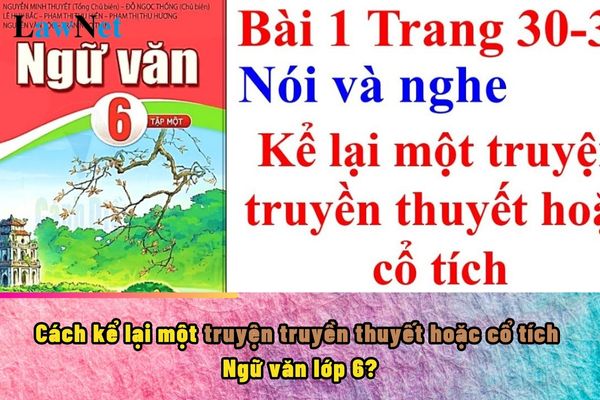Guidelines on retelling a legend or fairy tale for grade 6 students in Vietnam
Guidelines on retelling a legend or fairy tale for grade 6 students in Vietnam
Retelling a legend or fairy tale is a component of the listening and speaking section in Grade 6 Literature on pages 30 and 31 of the "Canh dieu" textbook.
Students can refer to the following method to retell a legend or fairy tale:
|
Method for Retelling a Legend or Fairy Tale A Few Essential Skills When Retelling a Story: |
*Note: The information is for reference only./.

Guidelines on retelling a legend or fairy tale for grade 6 students in Vietnam (Image from the Internet)
What are regulations on categorization of academic results of grade 6 students in Vietnam?
According to Clause 2 Article 9 of Circular 22/2021/TT-BGDDT, the academic results of Grade 6 students are categorized into four levels as follows:
- Excellent Level:
+ All subjects assessed by comments are rated as Pass.
+ All subjects assessed by comments combined with scores have a semester cumulative average or yearly cumulative average of 6.5 points or higher, with at least 6 subjects having a semester cumulative average or yearly cumulative average of 8.0 points or higher.
- Good Level:
+ All subjects assessed by comments are rated as Pass.
+ All subjects assessed by comments combined with scores have a semester cumulative average or yearly cumulative average of 5.0 points or higher, with at least 6 subjects having a semester cumulative average or yearly cumulative average of 6.5 points or higher.
- Pass Level:
+ At most 1 subject assessed by comments is rated as Fail.
+ At least 6 subjects assessed by comments combined with scores have a semester cumulative average or yearly cumulative average of 5.0 points or higher; no subject has a semester cumulative average or yearly cumulative average below 3.5 points.
- Fail Level: Other cases.
What are regulations on periodic assessment of grade 6 students in Vietnam?
Based on the regulations in Article 7 of Circular 22/2021/TT-BGDDT regarding periodic assessment forms for lower secondary school students:
- Periodic assessment (excluding modules of specialized topics), includes midterm and final assessments, conducted through tests (on paper or computer), practical exercises, and learning projects.
+ The test duration (on paper or computer) for subjects (excluding specialized topic modules) with less than 70 periods/year is 45 minutes, for subjects (excluding specialized topic modules) with over 70 periods/year is from 60 to 90 minutes; for specialized subjects, a maximum of 120 minutes.
+ For tests (on paper or computer) assessed by scores, the test is constructed based on a matrix, specification, meeting the required achievements of the subject outlined in the General Education Program.
+ For tests (on paper or computer) assessed by comments, practical exercises, learning projects, there must be guidelines and evaluation criteria based on the required achievements of the subject outlined in the General Education Program before implementation.
- Each semester, each subject assessed by comments has 1 midterm assessment and 1 final assessment.
- Each semester, each subject assessed by comments combined with scores has 1 midterm score (hereinafter abbreviated as DTGgk) and 1 final score (hereinafter abbreviated as DTGck).
- Students who do not participate in the prescribed number of assessments for valid reasons will be allowed makeup tests with equivalent requirements to the missed assessments. Makeup tests are conducted per semester.
- Students who do not take the makeup assessments will be rated as Fail or receive 0 points for the missed assessments.

